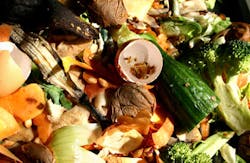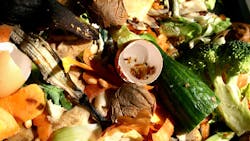EPA, USDA launch joint program for food waste reduction
The U.S. Environmental Protection Agency (EPA) and the U.S. Department of Agriculture (USDA) have joined forces to help Americans reduce food waste by lowering consumption and improving recycling rates for food products.
The Food Recovery Challenge program asks people to consider how much food and money they throw away on a regular basis. The two federal agencies claim that by joining the challenge businesses can save money, help their communities and protect the environment. The initiative is part of a broader EPA scheme called the Sustainable Materials Management Program, which aims to reduce the environmental impact of various materials throughout their lifecycle — from extraction and manufacturing to reuse, recycling and disposal.
Figures published on the EPA's website reveal that some 35 million tons of food waste were generated in the United States in 2010. Almost the entire amount, or approximately 97 percent, ended up in landfills or was incinerated. This means that tens of millions of tons were wasted as restaurants, food stores and homes disposed of food products. It is estimated that more than one-third of the overall food supply in the country is wasted. In 2008, the total food wasted in the country amounted to almost $390 per consumer, which is more than the average sum Americans spend on food per month. Meanwhile, in 2009, over 14 percent of U.S. households had no idea where their next meal would come from.
RELATED: Report calls for implementation of producer responsibility to boost recycling rates
Apart from financial losses, this waste also has a negative environmental impact, as food decomposition in landfills produces methane — a powerful greenhouse gas. Since food waste is the largest category of waste being dumped in landfills, diversion could have a significant effect on greenhouse gas emissions, the USDA said.
EPA acting administrator Bob Perciasepe commented that the agency was proud to be working with the USDA on such an important project that could result in a huge change for the whole food industry. The two agencies noted that a large proportion of food waste is not waste at all but is edible food that could feed millions of residents if it was managed properly. That is why the program is inviting all businesses, universities, stadiums and other venues where food is provided to take part and to help divert food from landfills and put it to better use. The program has set a target of having 400 organizations participating by 2015 and 1,000 organizations by 2020.
As part of the scheme the USDA is launching a series of related events, including projects for food waste reduction in schools and raising awareness of ways to cut down on waste and improving food storage among consumers. The agency will also be working in partnership with industry representatives to ensure larger donations of imported produce that does not meet all U.S. quality standards and to simplify procedures for donations of misbranded food products. An innovative meat composting project will be launched shortly to ensure that more meat is diverted from landfills after it has left food safety inspection laboratories, the USDA stated.



